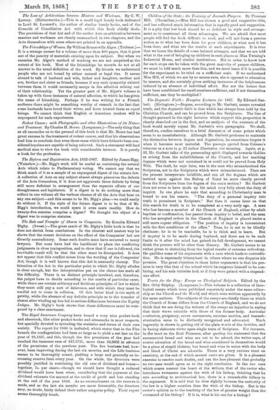The Sale and Transfer of Shares in Companies. By Kenelm
Edward Digby. (Sweet.)—The great merit of Mr. Digby's little book is that he does not shrink from conclusions. In the clearest and neatest way he shows that the recent decisions on the effect of the Companies' Act are directly contradictory. Some such doubts must have occurred to many lawyers. But none have had the hardihood to place the conflicting judgments in close juxtaposition, and to show that if one is followed, the inevitable result will be that the other must be disregarded. It does not appear that this conflict arises from the wording of the Companies' Act, though it is well known that this Act is unusually clumsy. The intention of the Act in the particular point to which Mr. Digby alludes is clear enough, but the interpretation put on the clause has made all the difficulty. There is no distinct principle involved, and, therefore, the judges have to decide according to the merits of particular cases, while there are certain arbitrary and fictitious principles of law to which they must still pay a sort of deference, and with which they must be careful not to come in collision. Of this latter kind is the myth of privity, while the absence of any definite principle as to the transfer of shares after winding np has led to serious differences between the Equity Judges. Mr. Digby's book shows that these differences must be com- posed by a clear enactment.


































 Previous page
Previous page